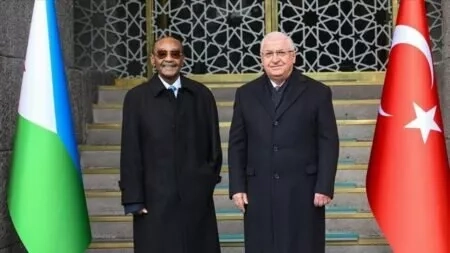Turkey and Djibouti have signed three agreements to enhance their military cooperation, as part of their efforts to strengthen their bilateral relations.
The agreements were signed on Monday in Ankara, where Djibouti’s National Defense Minister Hassan Omar Mohamed was received by his Turkish counterpart Yasar Guler.
The two ministers held a bilateral meeting, followed by a delegation-level meeting, which was also attended by Turkish Land Forces Commander Gen. Selcuk Bayraktaroglu.
According to the Turkish National Defense Ministry, the agreements include a military training cooperation agreement, a military financial cooperation agreement, and a cash aid implementation protocol.
The ministry said that the agreements aim to “further develop the existing friendly and brotherly relations between the two countries and contribute to regional peace and stability.”
Turkey and Djibouti have been enjoying close ties since they established diplomatic relations in 1977. Turkey opened its embassy in Djibouti in 2013, and Djibouti opened its embassy in Ankara in 2012.
The two countries have also been cooperating in various fields, such as trade, education, health, and infrastructure. Turkey has built several projects in Djibouti, such as the Ambouli Friendship Dam and the Abdulhamid II Mosque, which is the largest mosque in the country.
Turkey has also been providing scholarships, humanitarian aid, and military assistance to Djibouti. In June 2022, Turkey delivered Bayraktar TB2 armed drones to Djibouti, which were displayed for the first time during a military parade to celebrate Djibouti’s 45th independence anniversary.
Djibouti, with a population of less than a million, is a strategic partner for Turkey in the Horn of Africa, due to its location along the Gulf of Aden and the Red Sea, which are vital for global trade and security.
The signing of the military pacts is expected to further boost the strategic partnership between Turkey and Djibouti, and to increase their coordination and cooperation in regional and international issues.


